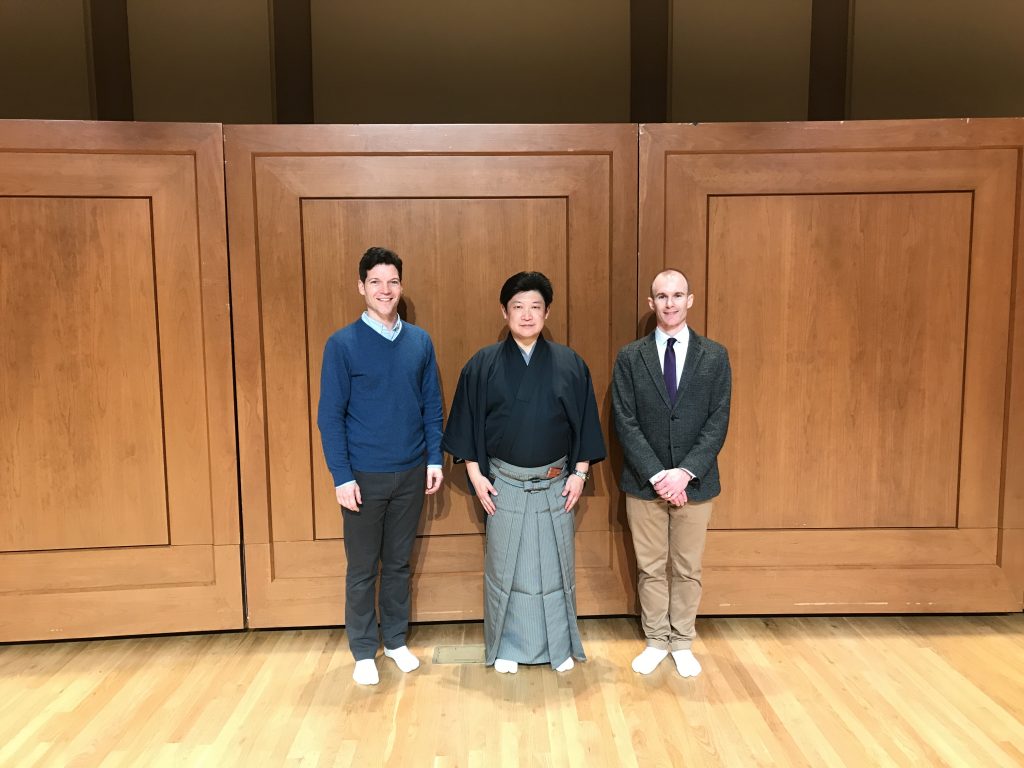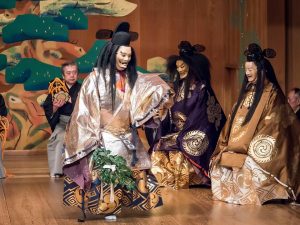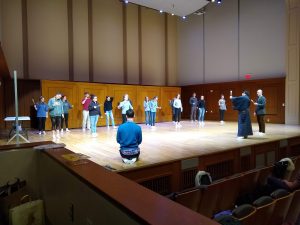
by Parth Upadhyaya
When a course development grant from Carolina Asia Center allowed UNC Opera professor Marc Callahan to travel to Kyoto, Japan in July 2017, the timing couldn’t have been better. Tim Carter, professor of music, had asked for Callahan’s group to put on a Kurt Weill opera. And when Callahan came across the opera, “Der Jasager,” based on a Japanese play called “Taniko,” he was inspired.
In Kyoto, Callahan studied at the renowned Traditional Theatre Training program, where he met Shingo Katayama, a 10th generation Noh theatre performer, and program director Matthew Shores. Callahan was excited to bring back all he learned about Noh theatre from Katayama and Shores. But he figured it’d be best for his students to learn from the two professionals firsthand, so he invited Katayama and Shores to Chapel Hill to teach his students. So, on Feb. 18 and 19 from 3:30 – 5:30 p.m., Katayama led a workshop on Noh theatre for the cast of UNC Opera’s “One Who Says Yes.”
The UNC Department of Music interviewed Callahan and Katayama (who spoke using a translator) about this opportunity.
UNC Music: What does it mean for you to speak to a group of students like this? And what impact did you hope to have in your visit?
Shingo Katayama: I’ve had a number of opportunities to speak with students this age in the past in America. Also, to students in Japan, as well. Whether the students’ majors were opera or something else, they’ve always had an interest in Noh. In wanting to bring something from my art into theirs, and because of that — and that’s the case here (at UNC) — it was really easy to talk to them, and I had a really good time speaking with them.
UM: What are some things that students can take away, as traditional opera performers, from Noh theatre?
SK: Rather than thinking of them as two different arts, I think of everybody as an individual. Whether they’re majoring in opera — and all of the students here are studying singing — I think everybody will take something different. Everybody will view it differently and feel it differently, so whatever they take from Noh in opera, it’s going to be their own. It’s not going to be just one thing — it’s going to be their own special (thing).
Of course, it would make me most happy if everybody would just love Noh and do nothing but Noh. But it makes me tremendously happy, too, if they could take away something from our time together. And if they don’t apply it to something today, then maybe someday they’ll be able to bring it back into their lives and reflect back on their experience with Noh.

UM: I read online that you got into Noh opera because of your father. Do you mind elaborating on that?
SK: I come from a long line of Noh actors, and I’m actually the 10th generation Noh actor in my family. We’re not the original family in our family line, but our family line of Noh actors goes back 10 generations.
UM: What are some things you learned from your father as a child?
SK: I learned everything from my father. In the Noh tradition, it’s convention that young boys begin studying Noh at the age of 3. That’s the age they start, and then they continue for life. That’s just the calling of a Noh actor. So, he’s basically my teacher, and he taught me everything I know.
UM: What was your reaction to being invited to UNC-Chapel Hill?
Matthew Shores: The program, T.T.T., Traditional Theatre Training, it’s in its 35th year, and (Katayama’s) been involved for about 15 years. And over that time, he’s been able to meet people from all around the world. And there’s been times that he’s been invited overseas. When Marc invited him to come, it had been some time since he had been to America, and he thought, wow, he would love to come back to America and see Marc again, work with Marc and work with his students.
SK: It feels like I am making a greater impact. Of course, I’m a professional Noh actor in Japan. But being able to reach out and actually cross the ocean to share this, it’s very meaningful to me, and I hope I’m able to bring something to people that I meet.
UM: How’d you meet Mr. Katayama and what led you here to invite him here to lead this workshop?
Marc Callahan: This year with the music department, we’ve been programming a lot of Kurt Weill music. And Professor Tim Carter asked me to put on a Weill opera with UNC Opera. So, I went through the entire repertoire of Kurt Weill operas, and I came upon this one short opera that was based on a Noh play. And at the very same time that I was discovering this piece, there was a course development grant from the Carolina Asia Center that was available. And so, I kind of put these two things together — the grant from the Carolina Asia Center and my UNC Opera course trying to program something by Kurt Weill — and I decided to do “Der Jasager,” or as we’re calling it, “One Who Says Yes” that’s based on the play “Taniko.”
From that, that grant allowed me to go to Kyoto (in July 2017), Japan to study at the Traditional Theatre Training program, at which (Shingo Katayama) teaches and Matthew Shores is the director. So, I studied there for three or four weeks and did a performance at the end. And then, I brought back the knowledge they gave me to the students to start working on their play — on their opera — which is very much in the style of Noh. It’s very loosely based on Noh, because, of course, we have to fit within the music of Kurt Weill. And I don’t have the knowledge base that 10 generations of a Noh actor would have, for sure. But one thing that was really important to me after meeting these amazing people in Kyoto was that I could bring them back to the United States so that they could shine some of their light on these students.

UM: Did that thought come up almost immediately, that you wanted to bring them here and have them lead and teach your students?
MC: Yeah, I do remember being in one of the classes — because you don’t know what to expect, you know? Going to the T.T.T. was completely a new idea. I had no idea what to expect. And when I was there, I fell in love with the program. I thought that the students could benefit so much from this idea of movement and breath, and legato and movement. It’s everything that they do in their singing, but just in a different craft. So, it was about halfway through the program (that) I just knew I had to invite them to come out here so that the students could benefit from their wisdom.
UM: Is there anything else you would like to add?
MC: We’re just so excited that they’re both here. I mean, it’s like a bit of a dream come true. It’s kind of surreal. And we’re just so fortunate to have this, kind of, sharing of cultures. I think traditional western opera and traditional Japanese theatre coming together and sharing ideas and sharing theories, just seeing how the two can relate and how we can all relate to one another, I think that’s really exciting.
To learn more about UNC Opera’s upcoming production of “One Who Says Yes”, click here.

